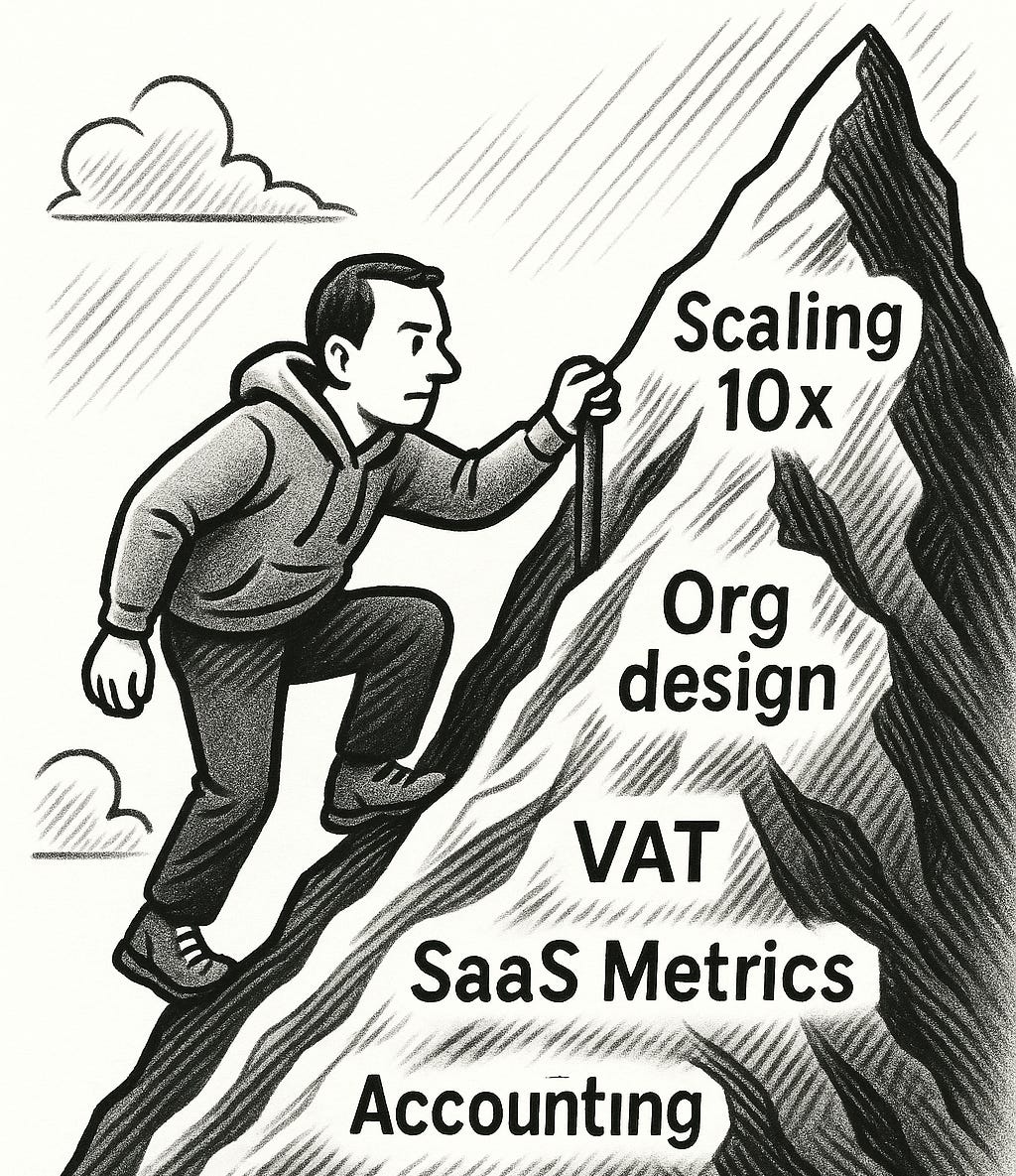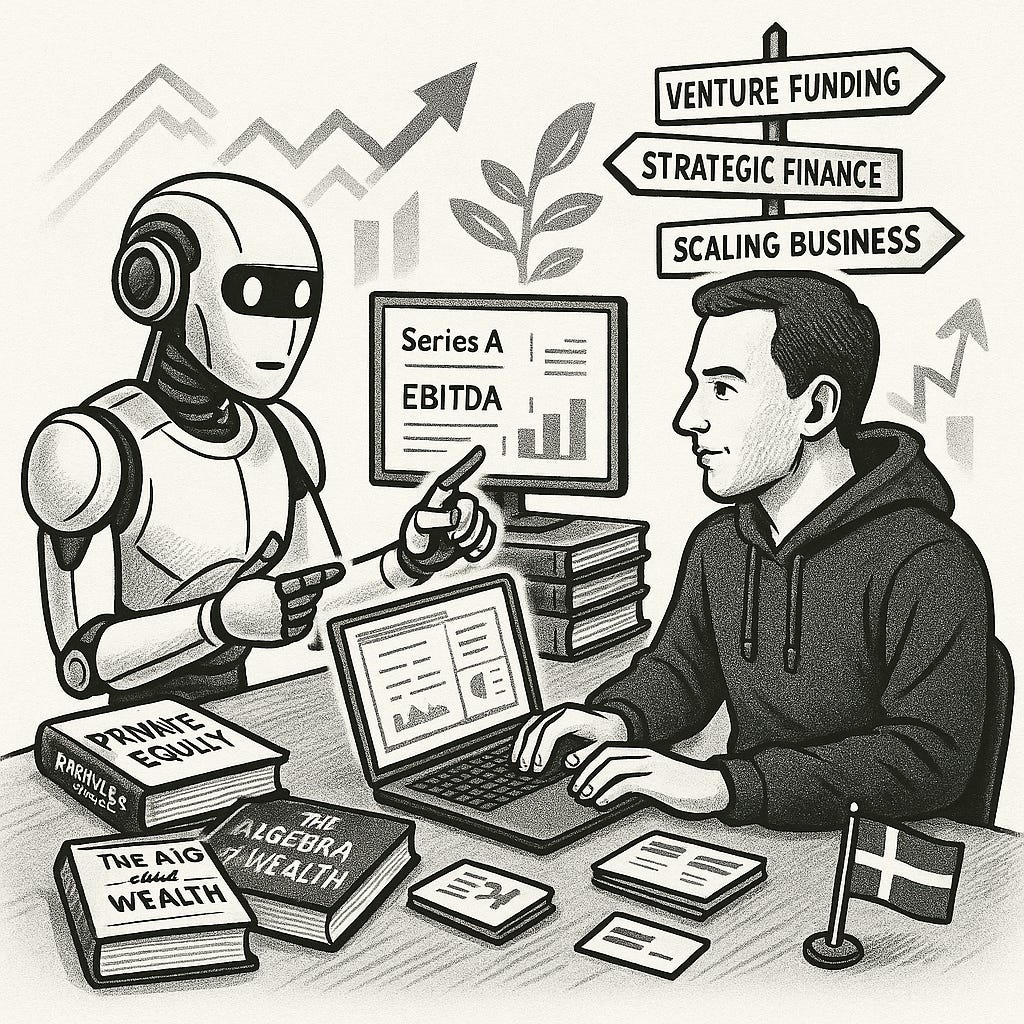🧠 The Learning Stack: How to get above-average at anything (really fast)
Learning speed is a superpower - and in startups, it might be the most valuable one. Here’s how I learn really fast, to go from curious to useful in any new role.
I used to think my edge was finance. After all, I spent 5 years at an American investment bank. But over time, I’ve realized that my real edge comes from something else: I learn fast. Not in a “10,000 hours to mastery” kind of way. But in a way that makes me dangerous really fast; understanding first principles, spotting patterns and challenging what others take for granted.
This post is a reflection on that skill. Not a guide or framework on “how to become an expert” - just what’s worked for me so far. I’ll go through how I approach new topics, how I absorb fast, and how I go from zero to useful in very little time.
And spoiler: it’s not discipline or some grand productivity system. It’s obsession. I get curious, I get obsessed, and then I go deep until I get it.
The ability to keep learning fast is probably the single biggest multiplier I’ve had in my career so far.
🔥 Start with obsession, not discipline
Once I become curious about something, it’s generally like an obsession kicks in and I start vacuuming knowledge. Very quickly I become “dangerous” on a topic: understand enough to ask the right questions and have above-average knowledge. Not an expert, by any means - and often making mistakes and being proved wrong. But I grasp the fundamentals quickly enough to build; and that’s the strongest skill you can have when you’re in startup/scale-up mode.
People often talk about discipline. Show up, train 10,000 hours, all the regular “10 steps to success” type of instagram inspiration. And while that’s probably true, it doesn’t work that way for me. I’m more driven by curiosity, and an obsession of understanding things. I have to understand something when it doesn’t make sense to me: it’s like an itch I can’t ignore.
If a Sales rep tells me a customer asked for something odd in a contract, my brain goes: why? Is it a local regulation? A tax rule we don’t know about? Something we should be aware of and adapt to? And before you know it, I’m deep into double-tax treaties and different interpretations of royalties and services leading to different applications of withholding tax.
But the most useful part of this skill is probably when starting a new role, or evaluating a new opportunity. First question I ask myself is: what’s the first principles here? What’s the direction required? Then I go looking for people who have done something similar, or had a similar journey; to go uncover all of the wisdom already built up.
📚 The learning stack: My approach
Here’s my approach, that has worked really well for me. Since leaving banking in 2020, I’ve been absorbing knowledge around how to scale companies. It started out very generally, and then in recent years my focus narrowed as I went down the path of becoming CFO of a B2B SaaS scale-up, which required more domain-specific knowledge.
🤔 It starts with an obsession of curiosity
For me, it started with this question: How do you actually scale a company?
The curiosity became my anchor, and it was the thread that kickstarted my entire career change. I’ve always enjoyed biographies, so I started reading books about journeys to build great companies and it just snowballed from there.
🦸 Find the experts
Find people who have done something similar and are sharing publicly. Then go down the rabbit hole of following them, but also consider who they follow and learn from. For me, it was people like Molly Graham (on building organisations), Dave Kellogg (on metrics and SaaS efficiency) and CJ Gustafson (on startup finance). And many of those came up, because I kept exploring and talking to people; reading articles and posts, networking with others asking them about their experiences and how they learned in their roles.
🧶 Pull the threads
One blog post leads to another. A podcast quote sends you into a rabbit hole. I started treating learning like research: dig, cross-reference, bookmark, repeat. I chased every thread until I understood the first principles behind it.
An added benefit? It gives you multiple views and angles. Bullets for when debating, and also different views - when building, there’s never just one correct answer. It’s always a balance of trade-offs and viewpoints depending on what you want to achieve.
🙋 Join the right communities
Glue Club was a game-changer for me. Suddenly I had access to other operators scaling fast, sharing real playbooks and experiences behind. I also joined Slack groups like CFO Connect, The SaaSiest Executive Network, and some smaller local CFO forums. Through these communities, I was able to expand my approach to problem-solving and checking with peers who had similar experiences.
Sometimes, I was dealing with problems specifically to our company; so I’d use my local CFO community, who also had been dealing with similar stakeholders and limitations.
Other times I was wrestling classic growth problems; those where it doesn’t matter whether you’re building in Europe or US, whether you’re B2C og B2B. For that type of problems, I leaned heavily on my international and broader networks, built through communities like the Glue Club.
🔂 Build a system for recalling information & repeating knowledge
I created a “Knowledge Library” in Notion where I saved down most things I read and found inspirational. Articles, blog posts, podcasts, etc. - it helped me stay a bit more organized.
Another helpful system for me is using Readwise. It was a game-changer especially when it comes to retaining knowledge from the books I read. I highlight phrases on my Kindle that I want to remember, and through Readwise I get 5 quotes each morning. It’s like that inspiration newsletter, curated with quotes I personally found inspirational.
🤖 What AI changed: Research assistant on steroids
Let’s be real: it’s 2025 and it’s hard to have any conversation without AI coming up. So let me just touch on what has changed as I’ve started adapting AI:
⚡ Turbocharged research: instead of getting stuck filtering through shitty Google results and unreadable lawyer- or tax-accountant-lingo, AI helps me extract and digest.
It’s not perfect. AI will hallucinate trying to give you an answer. And just like humans, I’ve noticed it too can interpret things wrong, or will skip things until you specifically ask in your prompt. I don’t trust it with the final answer before verifying; BUT, it turbocharges access and explains concepts in ways that I find helpful.
✍️ Writing! No, this post is not purely AI written (although I do think the GPT versions often ends up better 🤣). But for a long time I was struggling getting started - it took me almost a year from buying the domain name (the easy part!) to writing the first post here. Lots of ideas, but I got stuck with a blank page each time. AI prompting helps me structure, ideate and come up with the base. Then I keep expanding, iterating, re-writing and deleting. And the final post ends up being some weird mix of my inner voice and the AI’s way of writing.
On the flip side, it’s a fine balance. I’m starting to get tired of reading the same AI-generated posts and points everywhere; regurgitating best-practice with zero context, personality or actual lived experience. So I’m doubling down on being AI-enabled, but still giving you my raw, semi-unfiltered brain dumps of learnings.
🧑🏫 Reframing the output
The real flywheel comes once you get to test, practice and try out the things you learn. It sounds obvious but this point is actually hard. I read a lot, but experience just trumps a lot of it. The learning gives me the foundation, but it’s when I get to practice it becomes magic.
There’s lots of ways to reframe:
Write internal documentation
Summarize learnings and share with your team in Slack
Build templates and tools
Mentor others
Discuss with peers and networking groups
When forced to explain and teach, you’re forced to rethink. I noticed that it really turbocharged my own learnings, when I had to explain to others. Whether it was taking time to sit down with the sales team and teaching them about VAT rules and how they apply, or having sessions with the finance team discussing different solutions - the mere process for reframing the learnings helped solidify them.
And yes, eventually you’ll probably want to start a Substack to share the learnings with even more people! ;)
⚡ TLDR: Learning speed is a real advantage for startup operators and CFOs
I’m definitely not the smartest person (in the room or in general 🤣); but I’m often the one who learns fastest. Learning speed is a multiplier - and fast learning is a skill.
Here’s what I would recommend:
Get obsessed. The curiosity to really understand how the world works.
Ask questions. To yourself, peers, networking groups.
Steal from the best. There’s always someone who has done it before. Find them and learn from their journey.
Surround yourself with experienced people. When I got my first CFO role, I went and talked to every other CFO that I could find.
Use AI wisely. Learn how to work with it, but make damn sure you understand its limitation. (AI unfortunately breeds laziness which is a whole other topic)
What’s your learning stack - and how do you climb the learning curves when changing roles, pivoting or going into new fields?
📌 Bonus: My CFO learning stack
Here’s a list of resources that I used in my recent journey to CFO. It’s a curated list of the sources that have stuck with me, and been most helpful to me in my journey. Shout out to all the amazing people creating content and sharing knowledge.
📫 Newsletters for CFOs
Yes, these were also my inspiration to start writing this Substack!



